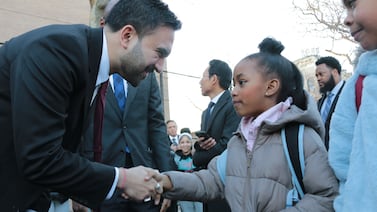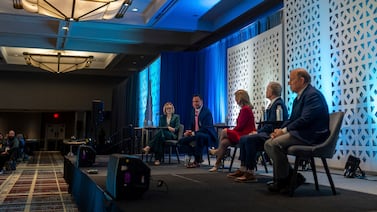Sign up for Chalkbeat Indiana’s free daily newsletter to keep up with Indianapolis Public Schools, Marion County’s township districts, and statewide education news.
The Indianapolis Public Schools board on Friday opposed any plan to create a future all-charter school system in a letter to the Indianapolis Local Education Alliance that listed seven requests for the group to consider as it rethinks the city’s school system.
The letter to the ILEA from the seven-member school board is among a litany of requests the ILEA has received in recent months. The letter, signed by all seven board members, is the first public list of requests the board has made to the group.
The group — created by state lawmakers and composed of Mayor Joe Hogsett, Superintendent Aleesia Johnson, and mayoral and district appointees — is tasked with providing recommendations for more efficient transportation and facility agreements across the city’s fractured charter and IPS school sectors. But the group could also submit other recommendations to lawmakers, such as a new governance structure for all school types.
The IPS board said in its statement that members “reject the notion” that a shift to an all-charter system “is the solution for education in our community.”
“Twenty years after the launch of charter schools in our city, student achievement remains low, with collective proficiency rates yet to reach 30% regardless of school type,” the statement said. “This is not criticism of charter schools—we proudly partner with multiple charter schools doing incredibly difficult work to serve students well.”
ILEARN rates for the charter sector as a whole range from roughly 10% proficiency in both English and math for independent charters to roughly 18% for charters associated with IPS and its Innovation Network, according to the latest 2025 results. Results for the district are at roughly 14%.
In its letter, the IPS board reiterated previous calls in ILEA and IPS board meetings to keep the school board democratically elected and noted school board elections for surrounding Marion County districts.
“The communities in each of these districts vote for their school board representatives, and there is no justifiable rationale why this practice should be different within IPS,” the statement said.
The letter follows the board’s recent public discussion on what it should ask the ILEA to consider. While most board members supported an elected board, member Deandra Thompson said at a meeting last week that she sees value in having some appointments to the board, such as a finance professional or attorney.
In their letter, IPS board members noted that examples from Newark and Chicago “demonstrate that communities are returning to elected governance models, recognizing that appointed boards diminish community voice and accountability.”
While Newark returned to an elected school board after years of state control, Chicago’s school board has transitioned from being fully appointed by the mayor to partially appointed and partially elected. The board there will be fully elected by 2027.
The IPS board also called for a moratorium on new schools and asked that the mayor’s Office of Education Innovation serve as the only authorizers of charter schools within IPS boundaries. Currently, three authorizers — Education One at Trine University, the mayor’s Office of Education Innovation, and the Indiana Charter School board — oversee such schools. Historically, 1 in 3 charter schools in Indianapolis has closed.
The board also called for transportation services to be safe while ensuring access for all students, including those with disabilities. Facilities belong to the taxpayers, the board argued, and any buildings no longer necessary for schools should be used for other “critical community needs” such as housing or early learning centers.
And the ILEA must acknowledge “the reality of adequate funding for public education,” the board said.
“We challenge the ILEA to present both the maximum and minimum of what it takes to educate a child in Indianapolis—and ask our community to decide what services and supports they are willing to fund,” the board said. “Our schools provide not only K-12 academic instruction but also Pre-K, health services, food pantries, mental health supports, and wraparound services that address barriers to student attendance and success. These services exist not because we receive specific funding for them, but because our schools are integral to our community.”
In some ways, the board’s proposal mirrors what other groups, including those who do and don’t support charters, have advocated for in ILEA meetings.
The Central Indiana Democratic Socialists of America have advocated strongly for a fully democratically elected school board, and called the IPS board’s letter a “powerful, principled stance” in a statement.
Meanwhile, parents affiliated with the Stand for Children Indiana, a nonprofit supportive of charter schools, have published a plan calling for both democratically elected and appointed school board members. A petition supporting the plan has garnered over 2,000 signatures, according to Stand.
In a statement, the Mind Trust nonprofit that has helped launch charter schools in the city said the board’s recommendations don’t provide solutions for improving student achievement and fail to address the district’s projected $44 million budget deficit for this year.
The next ILEA meeting is Oct. 22 at 6 p.m. at a location to be determined.
This story was updated to include a statement from the Central Indiana DSA.
Amelia Pak-Harvey covers Indianapolis and Lawrence Township schools for Chalkbeat Indiana. Contact Amelia at apak-harvey@chalkbeat.org.





